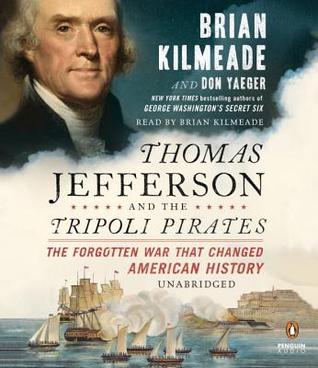Today I'm looking at a history of the Barbary Wars, the conflict between the early United States and the Barbary States of Northern Africa in the early nineteenth century. This was a fairly small conflict, all things considered, and despite initial setbacks it ended with a United States victory which proved that even the fairly weak United States of the era could project its power across the globe.
In the late eighteenth and early twentieth centuries, a handful of states such as Morocco and Tripoli engaged in large-scale piracy around the Straits of Gibraltar, an important shipping lane. These pirates would attack European vessels and take the crews and ships hostage, ransoming them back to the European powers. Most of the European powers at the time entered into arrangements with the Barbary States where sums of money would be paid to the Barbary States in exchange for freedom from harassment for their merchant shipping. Most European powers found the payments easier and less onerous than dispatching a military expedition, so they were content to simply buy peace.
When the United States became independent of Great Britain, however, its sailors and merchant marine lost the protections of the Union Jack. American ships and sailors were soon seized in increasing numbers by the Barbary States and had to be ransomed at exorbitant prices. When the United States, still effectively broke after the war debts of the American Revolution, tried to negotiate with the Barbary States, they found themselves mostly unable to meet the demands for payment. After years of negotiation and frustration, the United States finally gave up and dispatched its fledgling navy to the Mediterranean to provide a more forceful resolution to the conflict. After some initial setbacks, the United States managed to get enough of its military power in the Atlantic at once to force the Barbary States to favorable terms.
My biggest concern with this book was some of the tone that the book took. At the beginning and the end of the book, Kilmeade and Yaeger make a very, very half-hearted attempt to connect the war between the United States and the muslim Barbary pirates with the ongoing conflict between the United States and extremist muslim groups, mostly in the Middle East. I say this is half-hearted because they basically say, ''There are some parallels'' and then fail to provide any evidence or even a fleshed out argument on how these two events, separated by two centuries, are similar. Personally I find very little similarity between the two conflicts. The Barbary States were utilizing their geographic position for economic gain through criminal activities, much like how piracy has been common in recent times in areas such as Somalia and Indonesia. Geography simply provides an opportunity for pirates. The ongoing conflict between extremist muslims and the United States is a far more global and asymmetric conflict with a strong ideological component. I don't think it's fair to claim that both these conflicts were the same just because it features the United States fighting muslim populations. By that logic, the U.S. occupation of the Philippines would be the exact same conflict as well. I was worried that this would be the main theme of the book but as far as I can tell it remains mostly to the facts and doesn't devolve too much into an ideological tract.
Another thing that concerns me is that the audio book version I listened to was read by Brian Kilmeade himself, one of the authors. Kilmeade gets very excited during some of his writing and downright indignant at some of the things that were done by Barbary pirates to American citizens, such as the horrible conditions of slavery Americans endured. Now, I'm not saying that this is bad, but I don't think it's terribly fair for Kilmeade to get so dreadfully indignant about the situation. The Barbary pirates were fairly small-time operators , especially compared to the millions of people who were exploited by the Trans-Atlantic Slave Trade and the American Internal Slave Trade. The authors make a big point of Jefferson's authorship of the Declaration of Independence and the principle of America being a land of freedom, but this blatantly ignores the hypocrisy inherent in the American system. Slavery was one of the engines of America's early economic growth and Jefferson benefitted from it personally as a Virginia labor camp owner. To pit the conflict as a struggle between the despotic and evil Barbary States and the heroic and democratic United States is a gross oversimplification and blithely ignores the inherent inequality of past and even current America.
Overall I'd say this book is okay. I don't know terribly much about the Barbary Wars so I can't say how well this is researched but for the most part it seems to stick to the facts rather than engaging in ideological rants. Even when it does, Kilmeade and Yaeger don't go beyond a cursory attempt. Despite my concerns, I think this is a good source for basic information about this event in American history.
- Kalpar


No comments:
Post a Comment